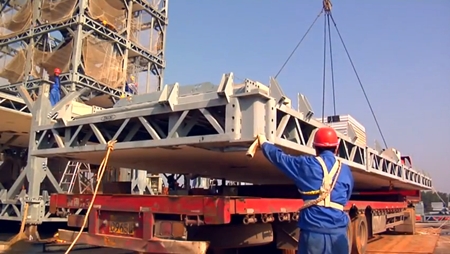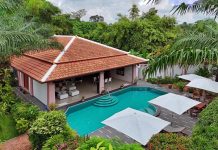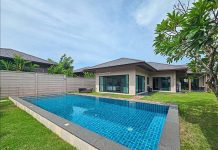In order to promote a greener and more efficient living environment, the senior vice president of the Broad Group from China, Juliet Jiang, was recently invited to the Green Building International series 2012 in Malaysia to share her expertise on constructing a green building efficiently and in the shortest possible timeframe.
The Chinese construction company used a unique prefabrication process to complete the assembly of a 30-storey tower that currently serves as a hotel in Hunan province in just 15 days. The video of this project has drawn the attention of millions of Youtube viewers since it was first posted.
 Workers help to construct the energy efficient and prefabricated 30-storey Ark Hotel in Hunan province, China in a record 15 days. (Photo/Youtube)
Workers help to construct the energy efficient and prefabricated 30-storey Ark Hotel in Hunan province, China in a record 15 days. (Photo/Youtube)
“We hope the focus is not just on the amount of time taken to complete this project. We would like to emphasize that we do not compromise quality in the process and would like to highlight the sustainability technology behind it,” Jiang said.
“The building has passed the resistance test of a level nine earthquake. It conserves energy up to five times more than that of a conventional construction, and provides air that is 20 times purer than the traditional buildings through our innovative air purification system.”
The accomplishment is made possible because 93 per cent of the building materials are manufactured in the factory. The company welcomes global franchisees to adopt this model and build such factories locally. In supporting the company’s value to be green, the factory should be located no more than 500km from the construction site, said Jiang.
There are currently six factories in China in different provinces. Besides China, BROAD Group also has a foot in India. These franchisees have made full payment for the transfer of technology which costs US$34 million for a population of 10 million and $50 million for a population of 50 million.
Architect Dr Tan Loke Mun, one of the GBI Accreditation Panel, opined that the compressed period of accomplishing a construction project would reduce the work hazards faced by construction workers on the site, wastage and traffic jams.
“Financially, this will help construction companies save up on interest costs,” he said.
The organiser of the series hopes that Malaysians will be inspired to make a difference to create a more sustainable and efficient living environment through this kind of innovation.
“All parties ranging from the consultants to the end users will benefit if the span of construction projects are cut. This can reduce the number of abandoned projects,” Tan said.




